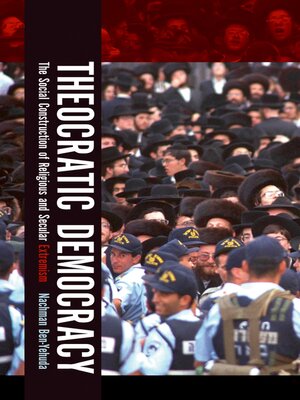Theocratic Democracy
ebook ∣ The Social Construction of Religious and Secular Extremism
By Nachman Ben-Yehuda

Sign up to save your library
With an OverDrive account, you can save your favorite libraries for at-a-glance information about availability. Find out more about OverDrive accounts.
Find this title in Libby, the library reading app by OverDrive.



Search for a digital library with this title
Title found at these libraries:
| Library Name | Distance |
|---|---|
| Loading... |
The state of Israel was established in 1948 as a Jewish democracy, without a legal separation between religion and the state. Ever since, the tension between the two has been a central political, social, and moral issue in Israel, resulting in a cultural conflict between secular Jews and the fundamentalist, ultra-orthodox Haredi community. What is the nature of this cultural conflict and how is it managed? In Theocratic Democracy, Nachman Ben-Yehuda examines more than fifty years of media-reported unconventional and deviant behavior by members of the Haredi community. Ben-Yehuda finds not only that this behavior has happened increasingly often over the years, but also that its most salient feature is violence—a violence not random or precipitated by situational emotional rage, but planned and aimed to achieve political goals. Using verbal and non-verbal violence in the forms of curses, intimidation, threats, arson, stone-throwing, beatings, mass violations, and more, Haredi activists try to push Israel toward a more theocratic society. Driven by a theological notion that all Jews are mutually responsible and accountable to the Almighty, these activists believe that the sins of the few are paid for by the many. Making Israel a theocracy will, they believe, reduce the risk of transcendental penalties. Ben-Yehuda shows how the political structure that accommodates the strong theocratic and secular pressures Israel faces is effectively a theocratic democracy. Characterized by chronic negotiations, tensions, and accommodations, it is by nature an unstable structure. However, in his fascinating and lively account, Nachman Ben-Yehuda demonstrates how it allows citizens with different worldviews to live under one umbrella of a nation-state without tearing the social fabric apart.







